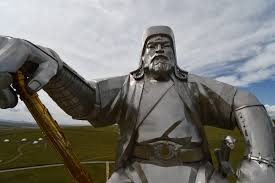Pope Francis Has it Right About Mongolia
Probably nearly all of us have the same impression about ancient Mongolia. It is of warriors on horseback with swords slashing their way across the world leaving a trail of blood and death. To the surprise of many, Pope Francis visited Mongolia four months ago.
The Pope has expressed a desire to have a relationship with Russia and that area to improve obstacles to understanding one another. But the visit to Mongolia, the first ever by a Pope, was even more remarkable because there are only 1,500 known Catholics in the entire vast country. There are about 3 1/2 million people in Mongolia.
Perhaps another surprise was the Pope's published remarks. He said the world should admire Mongolia for its policy of religious freedom. Christianity and Catholicism is so scarce there a local reporter was overheard asking, "Tell me again. What is this religion all about?" (NY Times)
Mongolia became an independent country, no longer part of the Soviet Union, in 1990. Its government is recognized as progressive and welcoming. What most of us know about Mongolia is its founder, Genghis Khan. He united the various tribes of that time, about the year 1200, and moved across the Stepps to form the largest nation in history. While his imagine is that of a ruthless military commander the history is mixed. He was a skilled diplomate and talented administrator.
Archeology indicates nomadic tribes lived on the Steppes before recorded history. They were there during the time Christianity grew and moved into Europe. They had various religious beliefs and did just fine not knowing there was something somewhere else called Christianity. Christianity never has had any importance in Mongolia and this remains the case today.
Also during the growth of Christianity were our own neighbors to the South. The Aztecs, Incas and others had advanced civilizations with some literacy. They, too, were doing well without Christianity. According to eyewitness accounts, the Christian invaders from Spain destroyed vast amounts of papers that could have provided understanding of those societies. The Christians brought guns and diseases.
Today, parts of Christianity worry about diversity and resist it at every turn. The world has always been a diverse place and it seems true to say the more the better.




Comments
Post a Comment